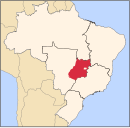São João da Paraúna
Appearance
São João da Paraúna | |
|---|---|
 Location in Goiás state | |
| Coordinates: 16°48′39″S 50°23′39″W / 16.81083°S 50.39417°W | |
| Country | Brazil |
| Region | Central-West |
| State | Goiás |
| Microregion | Vale do Rio dos Bois |
| Area | |
| • Total | 305.3 km2 (117.9 sq mi) |
| Elevation | 640 m (2,100 ft) |
| Population (2007) | |
| • Total | 1,699 |
| • Density | 5.6/km2 (14/sq mi) |
| Time zone | UTC-03:00 (BRT) |
| • Summer (DST) | UTC-02:00 (BRST) |
| Postal code | 75985-000 |
São João da Paraúna is a municipality in western Goiás state, Brazil.
Location
São João is located west of Goiânia, 36 km. north of Paraúna.
- Highway connections from Goiânia: state highway BR-069 west from Goiânia, through Trindade, Santa Bárbara de Goiás, Firminópolis, and then GO-164 for 32 kilometers south.
Neighboring municipalities: Aurilândia, Paraúna, Palminópolis, Jandaia, Acreúna.(Firminopolis),(São Luis dos Montes Belos)
Political information
- Mayor: Claudivino Ferreira da Silva (January 2005)
- City council: 09 members
- Eligible voters: 1,687 (December/2007)
Demographic information
- Population density: 5.56 inhabitants/km2 (2007)
- Urban population: 1,212 (2007)
- Rural population: 487 (2007)
- Population growth: a gain of about 300 people since 1980
Economic information
The economy is based on subsistence agriculture, cattle raising, services, public administration, and small transformation industries.
- Industrial units: 1 (2007)
- Commercial units: 17 (2007)
- Dairy: Laticínios MB Ltda (22/05/2006)
- Motor vehicles: 200 (2007), which gave a ratio of 8.5 inhabitants for each motor vehicle. (motorcycles and motorbikes not counted)
- Cattle herd: 30,500 head (5,190 milk cows) (2006)
- Main crops (2006): cotton, rice, beans, manioc, corn (1,340 hectares), and soybeans (2,900 hectares).
Data are from Sepin
Education (2006)
- Schools: 2
- Students: 453
- Higher education: none
- Adult literacy rate: 87.1% (2000) (national average was 86.4%)
Health (2003)
- Hospitals: 0
- Hospital beds: 0
- Ambulatory clinics: 2
- Infant mortality rate: 13.70 (2000) (national average was 33.0)
Municipal Human Development Index
- Life expectancy: 73.5
- School attendance rate: 0.837
- MHDI: 0.779
- State ranking: 34 (out of 242 municipalities in 2000)
- National ranking: 1,093 (out of 5,507 municipalities in 2000)
Data are from 2000
For the complete list see Frigoletto.com


